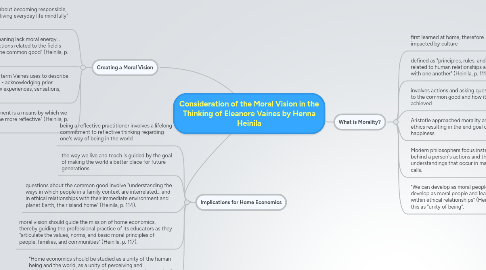Consideration of the Moral Vision in the Thinking of Eleanore Vaines by Henna Heinila
by Amy P.

1. Creating a Moral Vision
1.1. "A moral vision is about becoming responsible, caring citizens by living everyday life mindfully" (Heinila, p. 114)
1.2. "activities without meaning lack moral energy... With moral energy, actions related to the field's vision contribute to the common good" (Heinila, p. 113)
1.3. requires attaining enlightenment, a term Vaines uses to describe coming to understand "wholesight" - acknowledging prior knowledge while being open to new experiences, sensations, and understandings
1.4. "Enlightenment is a means by which we can become more reflective" (Heinila, p. 115).
2. Implications for Home Economics
2.1. being a reflective practitioner involves a lifelong commitment to reflective thinking regarding one's way of being in the world
2.2. the way we live and teach is guided by the goal of making the world a better place for future generations
2.3. questions about the common good involve "understanding the ways in which people in a family context are interrelated... and in ethical relationships with their immediate environment and planet Earth, their island home" (Heinila, p. 114).
2.4. moral vision should guide the mission of home economics, thereby guiding the professional practice of its educators as they "articulate the values, norms, and basic moral principles of people, families, and communities" (Heinila, p. 117).
2.5. "Home economics should be studied as a unity of the human being and the world, as a unity of perceiving and understanding, and as a unity of the emotions and reasoning" (Heinila, p. 117).
3. What is Morality?
3.1. first learned at home, therefore impacted by culture
3.2. defined as "principles, rules, and ideas that are related to human relationships and how we deal with one another" (Heinila, p. 111)
3.3. involves actions and asking questions related to the common good and how it may be achieved
3.4. Aristotle approached morality and ethics resulting in the end goal of happiness
3.5. Modern philosophers focus instead on the motives behind a person's actions and the reflection and understandings that occur in making judgement calls.
3.6. "We can develop as moral people and learn how to act or we can develop as moral people and learn how to live our moral vision within ethical relationships" (Heinila, p. 113). Heinila describes this as "unity of being".


